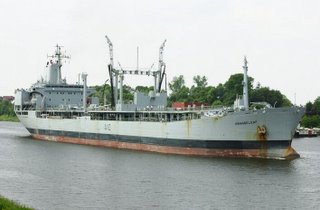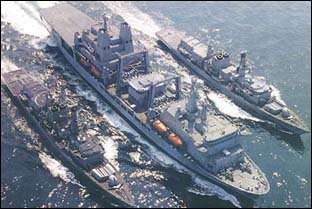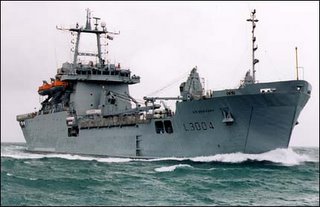 In DefenseNews this week, we see a story headed: "No UK Shipyards Picked for MARS Program", a headline – or anything like it - I guarantee you will not appear in the MSM.
In DefenseNews this week, we see a story headed: "No UK Shipyards Picked for MARS Program", a headline – or anything like it - I guarantee you will not appear in the MSM.Very few people, in fact, will know anything of the MARS programme and many would be puzzled by the reference to shipyards, believing that it somehow related to an aspect of the space programme.
However, we are dealing with yet another of these awful acronyms which, in this case means "Military Afloat Reach and Sustainability", a £2.5 billion MoD project for replacing and upgrading the support fleet which keeps the Royal Navy supplied while at sea, examples of which are ilustrated.
What brings this project to the forefront is that, after a delay in the decision to award development contracts – which we reported last October - the MoD's Defence Procurement Agency (DPA) has now announced its selection of three companies to compete for the role of project integrator on the project.
 Crucially, no British military shipbuilding company has been selected, the companies announced, reports DefenseNews, being the British project management company AMEC and two US giants: KBR, an offshoot of Halliburton; and Raytheon Systems. The UK shipbuilders BAE Systems and the VT Group were rejected. But then, so were the French-owned Thales UK, Maersk and Houlder Offshore.
Crucially, no British military shipbuilding company has been selected, the companies announced, reports DefenseNews, being the British project management company AMEC and two US giants: KBR, an offshoot of Halliburton; and Raytheon Systems. The UK shipbuilders BAE Systems and the VT Group were rejected. But then, so were the French-owned Thales UK, Maersk and Houlder Offshore. The appointment of "project integrator", in itself, gives no clues as to where the ships will be built. The "integrator" is a fairly new development in defence procurement, involving a company which essentially acts as a surrogate purchaser for the MoD, pulling together all the disparate parts of a project and delivering the completed systems to their user – in this case the Royal Navy.
 The "systems" we are looking at here is a complete fleet of logistic ships for the Royal Fleet Auxiliary, although the numbers and types so far have not been defined. But it is expected that about eleven ships will be built, ranging from oil tankers to sophisticated forward aviation support vessels and joint sea-based logistic ships able to support expeditionary forces ashore.
The "systems" we are looking at here is a complete fleet of logistic ships for the Royal Fleet Auxiliary, although the numbers and types so far have not been defined. But it is expected that about eleven ships will be built, ranging from oil tankers to sophisticated forward aviation support vessels and joint sea-based logistic ships able to support expeditionary forces ashore. And while it has not been which companies will build the ships, the strong suspicion is that they will be built offshore. Lord Drayson, stated on 15 February that British warship yards seeking the orders would have to achieve efficiency levels similar to commercial rivals overseas.
This, in effect, is a strong signal that these ships will be foreign-built, following the precedent set by the order of a fisheries protection vessel last year by the Scottish Executive, which went to a Polish shipyard in preference to a local Scottish firm.
Industry analysts say that, while BAE and VT have greatly improved efficiency, they cannot offset the substantial advantages commercial builders find in low-wage economies like Poland and Romania. In 2002, BAE delivered two 30,000-ton fleet tankers to the Royal Fleet Auxiliary for £110 million apiece. This time, the DPA has set aside only about £80 million for each of the 25,000-ton oilers.
This very much underlines the thinking set out in the recent Defence Industrial Strategy, which opened the door to less complex vessels like auxiliary and support vessels going overseas to reduce costs.
If, as expected, the construction does go offshore, to one or more European yards, it will mark yet another step in the gradual Europeanisation of our military supply programme.
The problem for us, on this blog, it that rational arguments can be expounded for this, and many other defence procurement projects being resourced offshore.
In this case, particularly, there is no question that Polish or other European yards would be able to build these ships far more cheaply than our domestic yards. Further, our remaining military shipbuilders are undoubtedly stretched by the current Type 45 programme and the coming carrier project, so it could be said that there is little spare capacity for this project.
Nevertheless, whatever the individual justifications for specific projects – each one of which may be valid taken in isolation – there is definitely an observable and undeniable trend.
 Basically, the evidence that we have offered on this blog is that government is committed to Europeanising the equipment of our armed forces, in pursuit of which - whenever possible – it will purchase European-built (or designed) equipment, even where a domestic supplier is available or a non-European product is considerably cheaper or better-performing.
Basically, the evidence that we have offered on this blog is that government is committed to Europeanising the equipment of our armed forces, in pursuit of which - whenever possible – it will purchase European-built (or designed) equipment, even where a domestic supplier is available or a non-European product is considerably cheaper or better-performing.There are, however, exceptions to this rule, and these seems to be: i.) where there is no suitable equipment available from a European supplier; ii.) where the equipment is part of an overall "heritage" system, when changing over to a European supplier would cause massive disruption, technical difficulties or vastly increased expense; and iii.) where a European venture has failed to deliver and the equipment is urgently needed.
If the MARS ships do go to European yards, therefore, it does seem as if we will be looking at more of the same, the continuation of a real, but much denied policy of Europeanisation.
COMMENT THREAD
No comments:
Post a Comment
Note: only a member of this blog may post a comment.